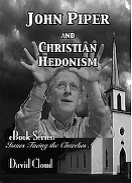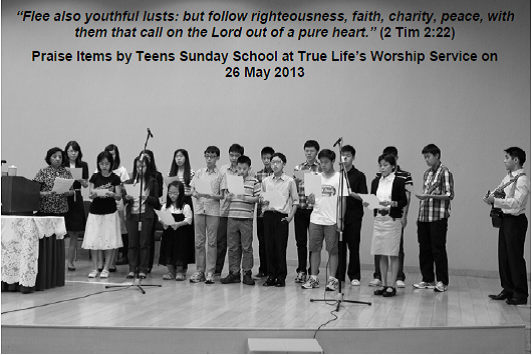CHRISTIAN HEDONISM
An extract from David Cloud’s e-book, John Piper and Christian Hedonism, available for free at http://www.wayoflife.org/free_ebooks/ john_piper_and_hedonism.php

Intermingling Happing with the Pursuit of God
To desire God is Scriptural, but incorporating my happiness into the principle is not. We would not argue with an emphasis on desiring God.
We are exhorted to delight ourselves in the Lord. We are to love Him with all the heart, soul, strength, and mind. We are to love Him so fervently that our love for any other person or thing appears to be hate (Luke 14:26). We are given the example of a soul that panteth after the Lord as a hart panteth after the water brooks. God is to be my rock, my fortress, my deliverer, my strength, my buckler, the horn of my salvation, my high tower.
No, there is absolutely nothing wrong with desiring God, and we cannot desire God too much. That is the purpose for which we were made. That is the very essence of genuine human life.
What we reject is the formula that John Piper has devised and the presentation of this particular formula as the essence of Christian living.
What we reject is connecting our happiness so directly with the pursuit of God, because the Bible does not do this.
There is plenty of happiness and joy in the godly Christian life even in this present world, but the Bible doesn’t emphasize this the way Piper does.
It’s true that we are promised rewards and encouraged to expect them, and it is true that it is not wrong to be motivated toward this end, but this does not add up to Piper’s Christian Hedonism.
It is also true that the New Testament says much about the “joy of the Lord” in the Christian life, but it is important to understand that joy is not the same as the emotional happiness so sought after by the world. There is much happiness in the Christian life, but it is an error to think that this is solely what the Bible means by joy and rejoicing. 2 Corinthians 6:10 says, “as sorrowful, yet alway rejoicing.” 1 Peter 1:6 says, “Wherein ye greatly rejoice, though now for a season, if need be, ye are in heaviness through manifold temptations.” Jesus Christ, who was anointed with the oil of gladness (Heb. 1:9), was also “a man of sorrows and acquainted with grief” (Isa. 53:3).
From these Scriptures it is evident that one can be joyful even when emotionally sorrowful, even when the spirit is heavy, even when one is acquainted with grief. CHRISTIAN JOY AND REJOICING IS, ABOVE ALL ELSE, STEADFAST CONFIDENCE IN GOD REGARDLESS OF
ONE’S CIRCUMSTANCES. This is evident in the use of the Greek words. The same Greek word translated “joy” in Rom. 5:11 (kauchaomai) is also translated “glory” (Rom. 5:3), “rejoice” (Rom. 5:2), and “boast” (Rom. 2:17, 23; 3:27; 2 Cor. 11:16). To boast or glory in Christ and the promises of God is rejoicing!
There is a great danger in identifying Christian joy solely with emotional pleasure, with a spiritual gaiety. Because of the fallen condition of this evil world and of our own corrupted nature, it is impossible but that we will experience a great deal of grief and heaviness in the present life. The great Apostle Paul said, “… even we ourselves groan within ourselves, waiting for the adoption, to wit, the redemption of our body” (Rom. 8:23). God does not promise to deliver the Christian from the pains of a fallen creation. There are those who would require the Christian to try to maintain an emotional exuberance, but this flies in the face of the Word of God. James 5:13 says, “Is any among you afflicted? let him pray. Is any merry? let him sing psalms.” Here the Word of God recognizes that there will be different emotional experiences among the members of a church at any given time, and it does not demand that all conform to a single euphoric standard. The afflicted one is not told to be merry; he is told to pray.
In fact, to the worldly Christian, the one who has become a friend to the world, who is rejoicing in fleshly merriment, the Apostle James says, “Be afflicted, and mourn, and weep: let your laughter be turned to mourning, and your joy to heaviness” (James 4:4, 9). This is apt exhortation for the present lust-living generation of Christians which are described in 2 Timothy 4:3-4.
The fullness and perfection of emotional happiness is something that belongs to the future when the believer will bask in the eternal glory of Christ in Heaven and the “old man” will be gone and we will have a resurrection body.
We must not make it our chief aim in this present world to seek such joy, or we will be severely disappointed. Like Jesus, “who for the joy that was set before him endured the cross” (Heb. 12:2), the child of God must set his face like a flint to endure the manifold sufferings of this present life with his eyes focused on the unspeakable joy which is to come; he must refuse to be sidetracked by a vain search for emotional euphoria in the here and now.
Happiness comes and goes in this present life. It is not something that should be pursued. The Psalms are filled with descriptions of melancholy and hardship. In Psalm 119 alone, we find the following conditions: the man of God’s soul breaks for longing (v. 20), melts for heaviness (v. 28), is filled with horror (v. 53), faints for salvation (v.81), is dried up like a leather bottle in the smoke (v. 83). He is almost consumed (v. 87), is near perishing in affliction (v. 92), is afflicted very much (v. 107). His soul is continually in his hand (v. 109); his flesh trembles for fear (v. 120); his eyes fail for salvation (v. 123). Rivers of waters run down his eyes (v. 136). He is consumed by zeal (v. 139), taken hold with trouble and anguish (v.143), in need of deliverance from affliction (v. 153). He has many persecutors and enemies (v. 157); is persecuted without a cause (v. 161); is gone astray like a lost sheep (v. 176).
The Bible’s description of the Christian life in this present world strongly emphasizes the trouble and persecution aspect.
The fullness of happiness is described more in connection with the next life rather than the present. This present life is described more in context of trouble than happiness. Romans 8 contrasts “the sufferings of this present time” with the glory that will follow in the next life. In this passage Paul describes the Christian life in terms of “sufferings” (v. 18), “waiting” (v. 19), “subject to vanity” (v. 20), “bondage of corruption” (v. 21), “groaning and travailing in pain” (v. 22), “groaning without ourselves” (v. 23), “waiting for the adoption” (v.23).
If happiness, even happiness in God, were the chief element of the present Christian life, Paul would not have said that were it not for the resurrection and the future life he is all men most miserable (1 Corinthians 15:19).
It is possible to find proof texts to support Piper’s emphasis on happiness that is found in the pursuit of God, but it is not supported by the overall teaching and emphasis of the New Testament.
The Foundational Error
The central error of Christian Hedonism is that it is not developed from Scripture but is read into Scripture. In Desiring God Piper operates an upside down principle of exegesis. He first defines his doctrine from human writings then goes to Scripture to prove it. He builds his case for Christian Hedonism from the writings of Blaise Pascal, C.S. Lewis, Jonathan Edwards, and others, and only afterwards does he go to Scripture for support.
Throughout the rest of his book he assumes the truth of Christian Hedonism and speaks of it as an established doctrine. He speaks, for example, of “this fact—that praise means consummate pleasure and that the highest end of man is to drink deeply of this pleasure.” But this is presumption, because he has not established directly from Scripture that this is a fact.
If the reader accepts that Piper has proven the truth of his doctrine, then he will not properly critique the proof texts he offers. This is how false teachers handle the Bible, and it is very effective because most people are not grounded in the principles of sound interpretation, such as examining the context, comparing Scripture with Scripture, and examining doctrine in the light of Scripture as a whole.
Like all heresies, Christian Hedonism is based on proof texts rather than the whole tenure of Scripture. If Christian Hedonism were so true and so important, there would be many passages in the New Testament epistles that would lay it out with perfect clarity, but in fact nowhere do the writers of Scripture offer Christian Hedonism as the “essence” or “secret” of Christian living.
[Ed: “Christian Hedonism” aka “The New Calvinism” is dangerous! The warning in 1 John 2:15-18 applies, “Love not the world, neither the things that are in the world. If any man love the world, the love of the Father is not in him. For all that is in the world, the lust of the flesh, and the lust of the eyes, and the pride of life, is not of the Father, but is of the world. And the world passeth away, and the lust thereof: but he that doeth the will of God abideth for ever. Little children, it is the last time: and as ye have heard that antichrist shall come, even now are there many antichrists; whereby we know that it is the last time.”]
Life BPC Sues FEBC Again
Life BPC filed a Writ of Summons on 27 June 2013 demanding that FEBC makes monetary contribution to Life BPC for use of utilities, maintenance and upkeep of the Premises from 4 March 1970 to 3 May 2008. Please pray the Lord to grant FEBC grace and wisdom to respond to this new suit.



